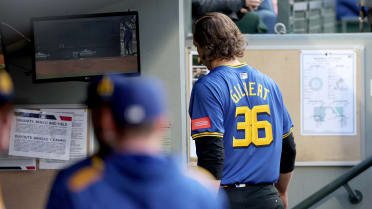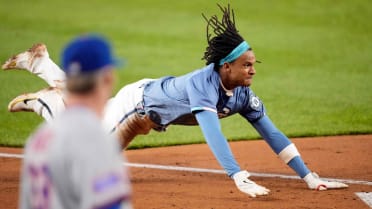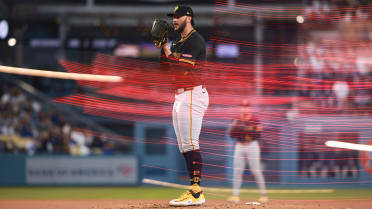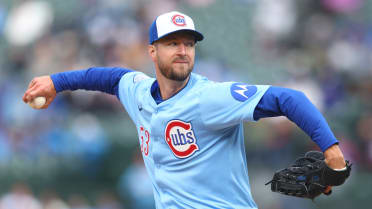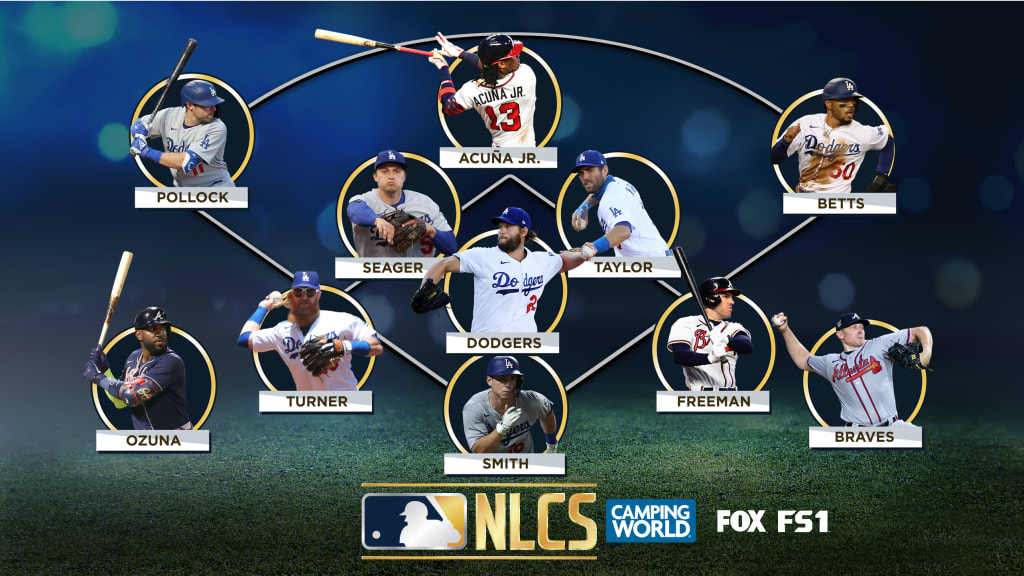
If you were to head on over to the hitting hard-hit rate leaderboard, you'd see the two teams about to square off in the National League Championship Series at the top: 1) Dodgers, then 2) Braves. OK, that tracks. Tons of good hitters there. They tied with one another for the best team slugging percentage in baseball at .483.
Now go check out the pitching version, and let's see who prevented hard-hit contact the most: 1) Dodgers, then 2) Braves. Ah. Well, there you go. Hit the ball hard. Don't let the other team hit the ball hard. Success will follow.
It's the simplest and most obvious thing in the world -- far easier said than done, obviously -- but if you can pull it off, you're going to get pretty far in this game. By definition, one of these teams is going to represent the NL in the World Series. But who? Neither has lost a postseason game yet.
Let's check them out, position by position, to see who has the advantage, but let's warn you straight away: We'll use OPS+ -- which adjusts for park factors and competition -- as our hitting stat of choice. This isn't going to be easy. (And not just because Will Smith might face Will Smith in a big spot.) There's so much talent on these rosters. Edges will be slim. Nowhere, perhaps, is this going to be harder to decide than at ...
Catcher
... where the Dodgers and Braves had two of the top four best-hitting catchers in baseball.
Is it possible that young Will Smith is already the best-hitting backstop in baseball? Well, yes. He was this year. He's been over the last two seasons. We know he won't start every day -- Austin Barnes is likely to keep catching Clayton Kershaw, and Barnes has a mere 73 OPS+ over the last three seasons -- but he struck out only 22 times in 137 plate appearances, and his hard-hit rate is similar to Nelson Cruz. He is extremely good.
Thing is, the Braves have their own quality backstops. Travis d'Arnaud mashed all year, to the point that his 58% hard-hit rate was somehow second only to Fernando Tatis Jr, and he hit two big homers in the NL Division Series. Tyler Flowers hasn't hit much and won't play much, but he, like Barnes, has long rated as a high-quality pitch framer. There are a lot of similarities here, and it's really hard to choose.
Tiny advantage: Dodgers
First base
Max Muncy is a very good hitter (145 OPS+ in 2018-19) who did not have a particularly good season in 2020 (97 OPS+), and he hasn't done a whole lot in the postseason, despite a few well-hit balls that couldn't find their way out of the massive Globe Life Field. We'd like to offer some underlying metrics that show he's a better hitter than he's shown, and he is, but it doesn't matter, because ...
... Atlanta's Freddie Freeman is almost certainly going to win the NL Most Valuable Player Award, having not only extended his status as one of the most preeminent hitters of the past 10 years but expanding it, posting a career-best 186 OPS+ along with an absurd .462 OBP. The Dodgers have a good first baseman; the Braves have a great one.
Advantage: Braves
Second base
The Dodgers were expected to have something of a rotating door at second base, but Chris Taylor has started every postseason game there so far. He had a strong season (128 OPS+); he's been an above-average hitter in each of his four full years with the Dodgers, posting a 116 OPS+ since 2017; he's added value with flexibility, as he's ended up in left field in four of the five games he started off at second.
He doesn't have the young star power of 23-year-old Ozzie Albies, obviously, who came up as a phenom in 2017 and proved it again the next two years. But his 2020 was more decent (99 OPS+, a .306 OBP) than great, and the fielding metrics don't love him as much as they did in 2018, either. Over the next three, five, 10 years, you're absolutely choosing Albies. Over the next week?
Advantage: Dodgers
Shortstop
We try not to put too much emphasis on postseason numbers in these, because a dozen or so plate appearances against high-quality pitching doesn't tell you all that much, but after Corey Seager put up an MVP-caliber season (152 OPS+), he's got a .947 OPS in the postseason, too. He started hitting on Day 1 of the abbreviated season and never stopped, coming in as baseball's second-best-hitting shortstop this year. (To Trea Turner, not Tatis.)
Dansby Swanson had a strong season for Atlanta, too (110 OPS+), continuing a run where he's increased his offense each year since 2017, and if you're picking between these two on defense, you're probably leaning towards Swanson. Seager's hitting advantage, however, is considerable.
Advantage: Dodgers
Third base
Year after year after year, Justin Turner keeps on humming. We're now seven years into his arrival into the Dodgers' clubhouse, and we're long past being surprised at his transition from "middling backup infielder non-tendered by the Mets" to "legitimately one of baseball's best hitters." Turner had a 135 OPS+ this year around some injury problems, and he's got a 139 OPS+ with the Dodgers dating back to 2014. If you like consistency, he's the West Coast, left-side version of Freeman.
Atlanta's Austin Riley did a credible job taking over the hot corner after Josh Donaldson departed, but a second consecutive season with an 86 OPS+ can't compare with Turner. (He did get there in a different way, however, dropping his strikeout rate from 36% to 24%, but with the tradeoff of a 56-point drop in slugging percentage.)
Advantage: Dodgers
Left field
You'd think the Dodgers had a platoon out here, with A.J. Pollock against lefties and Joc Pederson against righties, but Pollock keeps starting every day, so maybe they don't. Pollock bounced back from a somewhat disappointing Dodgers debut to slug .566 (134 OPS+) and tie for the team lead with 16 homers. Pederson remains available, and Taylor often ends up here for defense in the late innings.
It should be noted that Adam Duvall had quite a nice comeback season, after spending most of 2019 in Triple-A and having posted a minus-5 OPS+ -- yes, minus-5 -- in 33 games for Atlanta in 2018. Duvall mashed 16 homers, including two three-homer games. He's also a quietly underrated defender, though he's held back a little by a .301 OBP that held his season line to a 113 OPS+.
Advantage: Dodgers
Center field
Well, Cody Bellinger is the defending Most Valuable Player, two years after being the unanimous Rookie of the Year, and while he didn't exactly have a spectacular season by his standards (113 OPS+), you did see that catch, right? (And the homer he mashed earlier in the game?) It's incredibly difficult to find an all-around player who compares, much less exceeds.
Fortunately for Atlanta, it has one. Bellinger's down-ish season makes Ronald Acuña Jr.'s 155 OPS+ look even better, and it's not like he's without his own Rookie of the Year award or is lacking in his great postseason moments this year, either.
Advantage: Please don't make us choose between Ronald Acuña Jr. and Cody Bellinger. Braves.
Right field
Mookie Betts has hit 15 balls this postseason, and 12 of them have been hard hit, or over 95 mph of exit velocity. That's an 80% hard-hit rate, the best in the Majors, and you didn't really need another way to understand that Betts is one of the brightest stars in baseball, but there's another one. His first year in Los Angeles was one of his best (149 OPS+), and he's hardly slowed down in October, with five doubles and a 1.066 OPS.
On the other side, Nick Markakis had a little trouble getting going after deciding to return to the team shortly after the season started, not unsurprisingly. (His 84 OPS+ was the weakest of his career, though is contact rate remained above average.)
Advantage: Dodgers
Designated hitter
The Dodgers don't have a primary DH, and haven't all season. You'll see Pederson here some, and Smith will likely get a start here when Barnes is behind the plate. If there's one thing the Dodgers don't have, it's "a shortage of good hitters," and we haven't even mentioned the presence of Enrique Hernández off the bench.
But what the Braves have here is far more dangerous, and that's Marcell Ozuna, who came off of a pair of OK-but-not-great seasons in St. Louis to absolutely mash in Atlanta, hitting 18 homers along with a 1.067 OPS and a 175 OPS+. He's a notably poor fielder, but with the DH in the NL, that doesn't matter so much; Ozuna didn't play a single inning in the field against either the Reds or Marlins, and is unlikely need to find his glove against the Dodgers, either.
Advantage: Braves
Starting pitching
Despite his inconsistent postseason track record, Clayton Kershaw did throw one of the greatest October games in Dodgers history against the Brewers (13 strikeouts, 1 walk, no runs), and then was solid enough against a much better San Diego lineup in Game 2 of the NLDS, too. Walker Buehler is an ace on most teams, including maybe this one, and they can follow with some combination of Tony Gonsolin, Dustin May and Game 3 hero Julio Urías, though Dodgers fans may be forgiven if they didn't exactly love the "May as opener" shenanigans that preceded it.
The Braves are still feeling the loss of Mike Soroka to an Achilles tear back in August, but Max Fried blossomed into a true Cy Young contender, while Ian Anderson posted a 1.95 ERA in six late season starts before tossing 11 2/3 outstanding shutout postseason innings. He hasn't faced an offense like this one in October, however, and the open question behind the big two remains that of depth. Kyle Wright threw six shutout innings to finish off the NLDS -- this after a 5.21 ERA in the regular season -- but the team has yet to have to use a fourth starter, given back-to-back sweeps. Still, four shutouts in five games, opposing offense quality or not, remains incredibly impressive.
Advantage: Dodgers
Relief pitching
It wouldn't be October if you didn't have to ask some questions about the Dodgers' bullpen. This was actually a very good unit this season, as they did have the lowest ERA in the NL (2.74), and the addition of rookies Brusdar Graterol and Victor González has given Dave Roberts some new ground-ball weapons; the bullpen actually led the Majors in grounder rate (51%). But despite the sweep, back-end questions arose, such as how much Kenley Jansen can be trusted amidst declining velocity, and why Jake McGee (16 strikeouts and zero walks in 10 September appearances) hasn't yet pitched in the playoffs.
Meanwhile, the Braves expended plenty of time and money to reinforce their bullpen last winter, and it's mostly worked. The Atlanta bullpen has allowed the lowest postseason slugging (.150) and OBP (.186) of any of the eight teams that made it to the NLDS, and the two biggest names -- Will Smith and Mark Melancon -- have combined to face 26 batters and get 26 outs. Don't sleep, also, on secret weapon (or "Death Star," if you prefer) Tyler Matzek, who after a five-year absence from the Majors has struck out 8 of 12 hitters this postseason.
Advantage: Braves
These are two very strong teams, as you could probably tell by the fact that neither has lost a postseason game yet. It's hard to pick against this Dodgers team, though, despite Atlanta's bullpen advantage. Dodgers in 7.
Mike Petriello is a stats analyst for MLB.com, focusing on Statcast and Baseball Savant, and is also a contributor to MLB Network.

